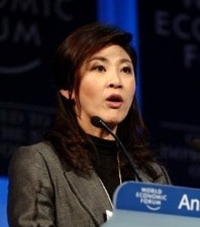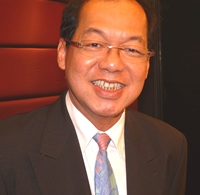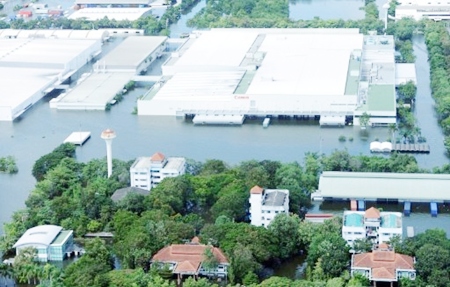|
PM convinces business leaders there will be no flood crisis
Prime Minister Yingluck Shinawatra has convinced
international business leaders that Thailand has prepared plans to prevent
future flood crises and that the country has potential to be centre of the
Association of Southeast Asian Nations (ASEAN) ready to offer investment
privileges.
Ms Yingluck was attending the 42nd annual World Economic
Forum (WEF) in Davos, Switzerland, and took the opportunity to attempt to
regain confidence of leaders and investors in Thailand after last year’s
flood crisis.
On Saturday, Yingluck met business leaders and CEOs under
the topic of “Public-Private Interaction on Thailand” to seek ways to
develop Thailand’s economic potential and policy on water management and
long term reform measures in Thailand.
The Thai premier has informed top executives that the
Thai government realized investors’ concern over the massive flood crisis
last year so the government has systematically laid down water management
plans to assure foreign business people that the government could handle the
flood situation and that there would be no future flood crisis.
A Single Command Authority would be set up to integrate
directives on water management to effectively handle the flood crisis, as
US$11 billion budget was set aside to repair and build infrastructure -
including dykes - and for disaster forecasting, she said.
Yingluck said that the flood crisis in Thailand last year
has shrunk Gross Domestic Product (GDP) growth by 2 percent but strong
economic sentiment could help rebound GDP growth to 5 percent.
The country’s financial and fiscal status remained
healthy, as foreign exchange reserves were high, with public debt-to-GDP
ratio at about 40 percent of GDP, she said.
The government has adhered to an investment promotion
policy by creating a free and competitive atmosphere, and would cut
corporate income tax to 20 percent next year, she said, adding that the
government would also dismantle obstacles for companies who wished to set up
their regional headquarters in Thailand.
Therefore, Thailand should be considered a good potential
business location, as it is a strategic location for ASEAN, and when the
ASEAN Community commences in 2015, the mobilization of goods, services,
investment, and labor would flow freely in the region. (MCOT)
|
|
 |
Thai PM stresses Thailand is good place for investment
Prime Minister Yingluck Shinawatra on Friday at the World
Economic Forum (WEF) in Davos, Switzerland said that Thailand remains a good
place for investment, as it is a center of and gateway to the region.

Ms Yingluck was attending the 42nd annual WEF.
During the 42nd WEF, Ms Yingluck has already participated
in three main sessions, including a round table discussion with
international leaders and executives, and an informal gathering of World
Economic Leaders (IGWEL) on “Defining the Imperatives for 2012” covering
sustainable economic growth.
She told the discussion that every country needed to
strengthen its domestic economy in order to weather fluctuations in the
world economy.
She was a keynote speaker at the opening conference
called “Women as the Way Forward” intended to exchange opinions on the
values and roles of female leaders.
Yingluck stressed the importance of the equality between
males and females for sustainable economic growth. She said the Thai
government has placed importance on developing women’s roles and their
quality of lives.
Yingluck also participated in a discussion with business
leaders and CEOs on “Public-Private Interaction on Thailand” to seek ways to
develop Thailand’s economic potential and policy on water management and
long-term reform measures in Thailand.
On Friday evening, Yingluck presided over “Thailand
Night” and told the group of 700 guests that attended the event that
Thailand not only has charming culture and natural beauty, but it is also a
good business opportunity for investors.
She assured guests which included world leaders and
business leaders that with effective water management, there would
definitely be no repeat of the flood crisis like last year’s problems.
The premier said Thailand was a strategic location to
link with other countries in the region and they have prepared investment in
infrastructure networking to all countries in the region.
Yingluck also invited the world and business leaders to
attend the WEF on East Asia that Thailand would host May 30-June 1 in
Bangkok.
The theme of this forum is “Shaping the Region’s Future
through Connectivity.” (MCOT)
|
|
 |
AFG looks at the auto industry post-tsunami,
post-floods and post-Eurozone crisis
Dr Iain Corness
The dynamic Automotive Focus Group (AFG) opened the 2012
year with an informative address by Charn Saralertsophon, director general
of the Federation of Thai Industries (FTI) and a former special adviser to
the Deputy Prime Minister and Minister of Commerce. Charn gave the members
an update on the Thailand Auto Industry today, after the tsunami/earthquake
in Japan, the floods in Thailand and the current Eurozone crisis.

Charn Saralertsophon,
director general of the Federation of Thai Industries.
Going along with the current AFG practice of rotating
venues, the January meeting was held at the Nova Platinum hotel, with the
formal part of the proceedings followed by networking around the pool. As
opposed to the chambers of commerce which cover many interest groups, the
members of the AFG are part of the auto industry in Thailand. This makes the
networking of enhanced value, with everyone understanding the industry where
the others are coming from! Fifty members attended this first meeting of the
year.
Charn Saralertsophon began by stressing that the Thai
auto industry has always been resilient, and it should not be forgotten that
Thailand’s auto production exceeds that of Italy, Indonesia and Malaysia. He
also stated that the big name world manufacturers were not just looking at
Thai production figures, but also had bases here because of the top quality
workmanship. It was of interest that 11 percent of Thailand’s exports go to
Central and South America, because the marketplace there has more faith in
Thailand produced vehicles than from elsewhere.
He produced many informative graphs showing, for example,
that the one million vehicle milestone was passed in 2006, and until the
flood situation, Thailand’s production was well on the way to two million in
2011. The car production figures expected were in excess of 1.8 million, but
the natural disasters, and financial disasters, meant that the figure for
January to October was 1.4 million. Still not a bad figure. The Auto
industry provides 10 percent of the nation’s GDP, and there are 690 Tier 1
companies in Thailand.
Charn spoke on the eco-car production, and although there
are currently only two manufacturers of eco-cars, there are another three
manufacturers coming. The production of these alone would very quickly push
the annual production total past the two million mark.
Contrary to what people had thought, the Thai government
had already instituted an eight point plan to assist local factories that
had been inundated. Many of these were excellent stimuli for the industry,
but the news had not been well promulgated. This factor produced some
spirited questions at the end of the session, along with further details on
the B. 300 minimum salary.
He finished with a slide showing the supportive factors
that attracted investment in the Thai auto industry, including the fact that
Thailand can be the gateway to 650 million people in ASEAN, and a
springboard to China and India.
It had been a wonderfully informative session for the AFG
members, but in addition Uli Kaiser spoke on his new Thailand Auto Industry
Handbook for 2012, which is an invaluable resource for anyone doing business
in the auto sector.
The next AFG meeting is the AGM to be held at the Amari
Orchid resort on February 17. More information can be obtained from the
secretary Maurice Bromley via email Maurice.Bromley @go-dove.com.
|

|
More workers will be
unemployed after flood

More workers are expected to be unemployed after last
year’s flood crisis reduced forward purchase orders for some factories while
others shifted their production to other provinces to avoid a repetition of
flood problems, according to a senior labor official.
Labor Protection and Welfare Department Director-General
Arthit Isamo said that starting from the end of January, the establishments
that were affected by the flood would terminate more contracts with their
employees due to the lack of advance purchase orders.
Meanwhile, some companies have moved their production
bases to other provinces to avoid possible flooding, but would not relocate
their factories abroad, he said.
The department, however, believed that unemployment will
not reach the 100,000 worker level earlier forecast by many agencies.
According to official figures, he said, there were in
total 28,195 workers being laid off from 99 flood-hit factories, while 350
factories could not reopen and 167,541 workers have not returned to work.
At present, 28,317 factories have reopened and resumed
normal production, and 822,444 workers have returned to work already, he
said.
Arthit said the department would collect information of
the affected factories and the numbers of laborers unemployed before
reporting to the labor minister. He added that the situation would become
clear after Jan 31 when the three-month project period to help workers
unemployed from the flood crisis ends. (MCOT)
|

|
|

